Armour Thyroid and Synthroid are medications used to treat hypothyroidism (an underactive thyroid).
Synthroid is the most commonly prescribed, however some claim Armour Thyroid produces better results.
So, which is the best treatment for you?
This article looks at the evidence for both to help you decide.
What is Hypothyroidism and How is It Treated?

Armour Thyroid and Synthroid are medications used to treat hypothyroidism.
In this condition, the thyroid gland is underactive, meaning insufficient amounts of thyroid hormones are produced.
Three main hormones are measured to determine if the thyroid is functioning properly: thyroid stimulating hormone (TSH), Thyroxine (T4) and, in certain circumstances, triiodothyronine (T3).
You can read more about these hormones in these guides to interpreting TSH levels and T4 and T3 levels.
It’s important to remember that the thyroid gland produces mainly T4, even though the active hormone is T3. An enzyme in the body converts T4 into T3 when needed.
Currently, there is no cure for hypothyroidism and, in most cases, medication will need to be taken for life.
Armour Thyroid
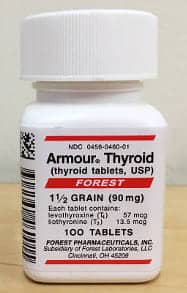
Armour Thyroid is the brand name for desiccated thyroid extract, made of dried and powdered thyroid glands, usually from pigs.
It contains a mix of both T4 (around 80%) and T3 (around 20%).
Desiccated thyroid extract is measured in grains.
One grain contains around 38 micrograms of T4 and 9 micrograms of T3. Grains can be taken in multiples or fractions (e.g. half a grain or two grains) to achieve the correct dosage.
Desiccated thyroid extract also contains unmeasured amounts of calcitonin, diiodothyronine (T2) and monoiodothyronine (T1). However, these components are not thought to have any significant effects in the body.
Other brand names include:
- Nature-Throid
- WP Thyroid (previously known as Westhroid-P)
- NP Thyroid
Synthroid
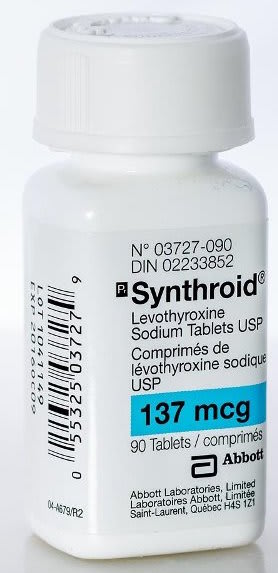
Synthroid is the brand name for a synthetic thyroid medication also known as levothyroxine sodium.
It contains only synthetic T4, which is biologically identical to the T4 produced by the body. Once ingested Synthroid is converted by the body into T3, the active thyroid hormone.
It’s taken in pill form and comes in a range of doses.
Synthroid is one of the most popular, but other brand names include:
- Levothroid
- Levo-T
- Levoxyl
- Tirosint
- Unithroid
Synthetic T3
There is an additional thyroid medication called liothyronine.
This is a synthetic version of triiodothyronine or T3. Brand names are Cytomel or Tertroxin.
Summary: Thyroid stimulating hormone (TSH), Thyroxine (T4) and triiodothyronine (T3) are measured to test thyroid function. Armour Thyroid and Synthroidare the two main medications used to treat hypothyroidism. There is also a third type of medication made of synthetic T3.
Why Did Doctors Switch from Armour Thyroid to Synthroid?

Desiccated thyroid extract was the original medication used to treat hypothyroidism.
During this time, thyroid hormones were not completely understood and there was a lack of reliable diagnostic tools (blood tests) to measure circulating levels in the blood.
This lead to the following problems:
- Difficulties determining the correct dose for the individual.
- Difficulties measuring the exact amount of T4 and T3 present in desiccated thyroid extract.
As a result, the dosage was often too high and serious side effects were often reported. Also, due to inconsistencies in the strength of medication, some people were not seeing any improvements.
Conversely, Synthroid (levothyroxine) was thought to offer a safe and consistent dosage. Two things lead to this switch:
- The discovery that most T3 was converted from T4 via an enzyme in the body. This meant medication need only contain T4 to be effective.
- The diagnostic tools for measuring blood levels of thyroid hormones advanced. Scientists were able to see that Synthroid was effective at normalising blood levels of thyroid hormones (1).
Summary: Desiccated thyroid extract was the first type of medication used to treat hypothyroidism. Eventually, a synthetic T4 medication was created and found to be a safer and more effective option.
Evidence For The Use of Synthroid Over Armour Thyroid?

Synthroid (levothyroxine) is the recommended treatment for hypothyroidism and prescribed by most doctors.
The American Thyroid Association along with other international thyroid organizations agree that Synthroid is the most effective treatment option.
There is no strong evidence to suggest Armour Thyroid or a combination therapy of synthetic T4 and T3 produce better results than Synthroid in most people (1).
More specifically, Synthroid is recommended over Armour Thyroid because it:
- Efficiently reduces symptoms of hypothyroidism
- Has minimal side effects
- Is well-absorbed by the intestine (around 70-80%)
- Provides consistent blood levels of thyroid hormones with minimal spikes of T3 or T4
- Is low in cost (2).
The European and American guidelines also acknowledge that experimental use of synthetic T3 may benefit some people. This will be discussed in more detail below.
Summary: Current thyroid association guidelines recommend Synthroid as the first treatment option. There is little evidence to support the use of Armour Thyroid over Synthroid.
Do Some People Feel Better on Armour Thyroid?

Anecdotal (personal) reports claim Armour Thyroid leads to increased feelings of wellness and reduced symptoms as compared to Synthroid.
Studies suggest up to 15% of people with hypothyroidism don’t see complete improvement on Synthroid (2, 3).
In a double-blinded study of 70 participants, those taking Armour Thyroid lost nearly three pounds more than those taking Synthroid. Also, 49% of participants said they preferred Armour Thyroid based on improvements in symptoms and mental wellbeing (4).
However, this is only one study of many.
It’s possible a small percentage of people feel better with Armour Thyroid because of the T3 component. This may have to do with genetics.
Some people with specific genetic mutations may not be able to either convert T4 into T3 or transport T3 in and out of cells from the blood. Blood tests do not always accurately reflect the levels of T3 inside tissues such as the brain and liver (5).
This means people may still experience the side effects of hypothyroidism, yet appear to have blood levels of T3, T4 and TSH within the normal ranges.
Summary: Some people claim to feel better when using Armour Thyroid, but there is limited evidence supporting this opinion. It’s possible increased feelings of wellbeing could be attributed to low T3 levels.
Is Armour Thyroid Better Because it Contains T3?
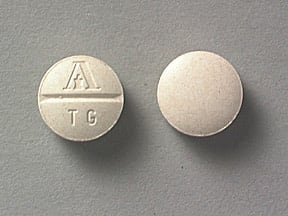
One of the main arguments for the use of Armour Thyroid is that it contains T3 as well as T4.
It’s possible that a minority of people will do better on a combination of T3 and T4 replacement therapy. However, there is only a small amount of evidence available to support this theory (5).
A trial of combination T4 and T3 therapy is recommended for patients who do not experience symptom relief on Synthroid. This is experimental and should be stopped if no positive results are seen after three months (3).
While it may be beneficial, there are some issues associated with using Armour Thyroid to replace T3, including:
- Inconsistent dosage in Armour Thyroid: There may still be inconsistencies and stability problems in the preparation of Armour Thyroid. This can result in fluctuating blood levels of thyroid hormones.
- Difficulties maintaining T3 levels: The ratio of T4 to T3 in Armour Thyroid is much higher than that typically excreted from a healthy human thyroid. Additionally, T3 does not last as long in the body and is much more difficult to maintain a consistent level.
T3 levels may spike or become elevated and symptoms such as heart palpitations and others seen in hyperthyroidism can occur. Slow release or multiple daily doses of synthetic T3 are likely to produce much more consistent blood levels and less side effects (2, 5).
Summary: A certain subpopulation of hypothyroid patients may do better on a combination of T4 and T3. However, the best results will likely be achieved with synthetic T3. The ratio of T4 to T3 in Armour Thyroid is not ideal for humans and can lead to side effects associated with elevated T3 levels.
Is Armour Thyroid Better Because It’s Natural?

Many holistic blogs claim that desiccated thyroid extract is superior because it’s natural.
However, all of these products contain synthetic fillers to hold the pill together, meaning they are never 100% natural (6).
Because synthetic T4 and T3 are biologically identical to the natural hormones, they produce exactly the same actions within the body (2).
The only difference is that Armour Thyroid also contains calcitonin, T1 and T2, which may be biologically active (meaning they produce effects in the body).
However, there does not appear to be any evidence that they produce any significant effect in these amounts.
Summary: Synthetic thyroid hormones are biologically identical to animal hormones and will produce the same effects. No pills are 100% natural; all contain synthetic fillers regardless.
Armour Thyroid vs. Synthroid for Weight Loss

Many people with hypothyroidism have difficulties with weight loss.
Losing weight can often help bring thyroid hormone levels back to normal. This can be achieved with both Synthroid and Armour Thyroid.
As mentioned earlier, a study on 70 people saw greater weight loss in participants taking Armour Thyroid (4).
However, this was only one single study and these results have yet to be replicated.
For more information on managing weight with hypothyroidism read this article and this one.
Summary: Both Armour Thyroid and Synthroid promote weight loss, which can help bring hormone levels back to normal.
Side Effects of Armour Thyroid vs. Synthroid
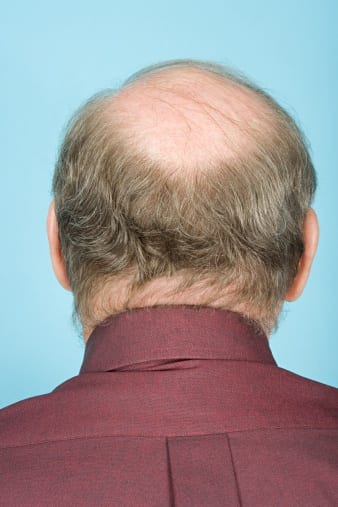
As with all medications, there are potential side effects, sometimes a result of the dosage being too high.
Synthroid side effects include:
- Unintentional weight loss
- Overheating and sweating
- Nervousness, anxiety, irritability
- Digestive problems such as pain and diarrhea
- Headaches
Some Armour Thyroid side effects are similar to Synthroid but also include the following:
- Allergic reactions
- Chest pain
- Irregular heartbeat
- Swelling of the hands and feet
- Seizures
Armour Thyroid is not recommended during pregnancy and should be discussed with your doctor.
Summary: Both Armour Thyroid and Synthroid have potential side effects including increased appetite, hair loss, headaches and more.
The Cost of Armour Thyroid vs. Synthroid
Thyroid medication needs to be taken for life, so the cost can be an important factor.
Price typically varies depending on the strength of the dose. Per 30 pills (in USD):
- Synthroid: $27-$36.
- Generic levothyroxine or other brand names: $12-$35
- Armour Thyroid: $19.50-$50
Summary: Generic levothyroxine is cheaper than branded Synthroid, while Armour Thyroid is typically the most expensive option.
Armour Thyroid vs. Synthroid: How to Choose Which is Best for You
The first line of treatment for hypothyroidism should be Synthroid (levothyroxine).
This is due to the possible side effects and lack of evidence for the use of either Armour Thyroid or combination therapy. Essentially, T3 given in medication (Armour Thyroid) makes regulating blood T3 levels difficult. As a result, acute or chronic side effects may occur.
Synthroid produces more consistent hormone levels and fewer side effects. For the majority of people, Synthroid will correct thyroid hormone levels and symptoms will resolve.
A minority of people may not find symptom relief with Synthroid. In this case, experimental therapy with a combination of synthetic T4 and T3 may be warranted under the supervision of an endocrinologist.
While there are anecdotal reports of Armour Thyroid producing superior results, there’s a lack of evidence to support this. It appears that using synthetic T3 is more reliable than using Armour Thyroid.
It should be noted that hypothyroidism associated with thyroid surgery, cancer or pregnancy may require a different treatment plan. The information in this article mainly refers to idiopathic (no known origin) or autoimmune causes of hypothyroid such as Hashimoto’s disease.

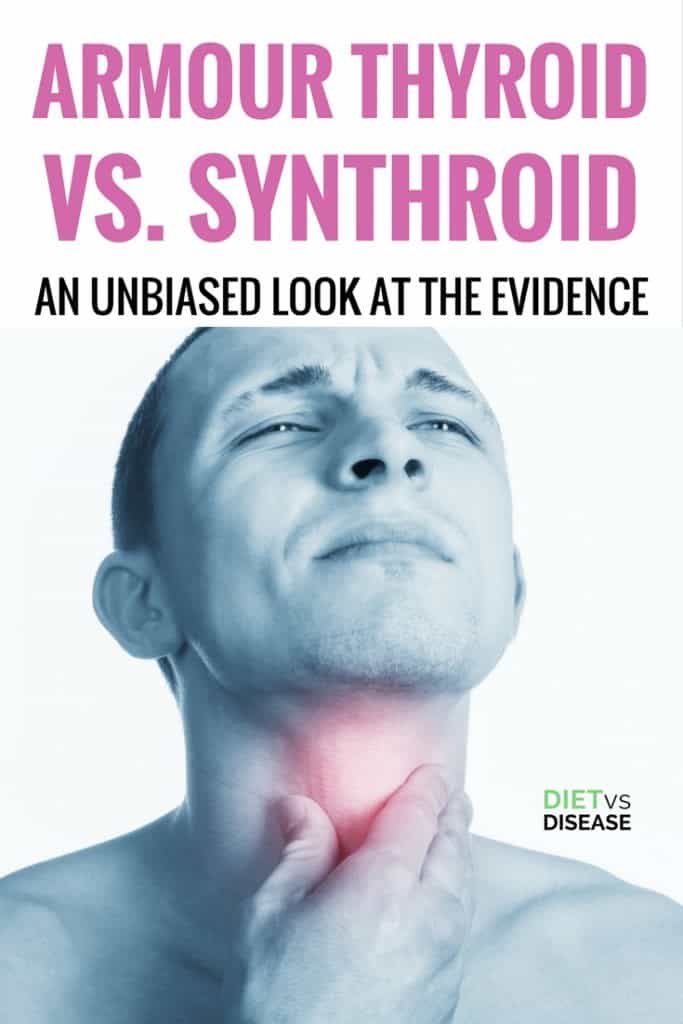
Hello,
I am curious as to your thoughts on lab reference ranges and testing. Conventional doctors test TSH only, while NP’s do a full thyroid panel.
Also, some groups suggest free T3 should be in the top 1/3 of the reference range to reduce fatigue. My free T3 is low, sometimes not even in range. What are your thoughts on adding synthetic T3 to synthroid?
Thank You,
Sandy
Im a Hashimoto sufferer 68, for about 9 years. Im in Adelaide, South Australia. My first doctor did not even tell me I had Hashimotos. I found out because they referred me to an endocronlogist and I opened the letter! Endo said keep me on the T4! (Thyroxene in UK and Aust, Synthroid in US) and changed the doses many times. Never told me about diet, to get off wheat and dairy. Ive been to about 7 doctors and one Thryoid Clinic (who said get off dairy and gluten), all a waste of time and money. One doctor put me on dessicated thryoid, that was a great for a time, but he was not any good titrating the doses, he was more interested in himself. Another doctor, well known and respected here, said, “Just let your thryoid die and then we can treat you”. If your doctor can only offer you T4, find an intergretive doctor. The one I went to a few months ago, arranged saliva tests for thyroid and intolerance food tests. I was stunned when I had sensitivities to banana, cane sugar, pineapple, green beans, kidney beans, pinto beans, the last 3 were off the charts. I had absolutely no digestive problems that I knew off and no reactions to these foods. Doctor also got me to go on mega doses of probiotic, I dropped 4lbs/2 kgs in 2/3 weeks with the probiotics and avoiding these foods. If anyone is serious about helping themselves with Hashimotos/Graves, follow US Pharmacist Izabella Wentz. I got 2 of her books and followed her Hashimoto Protocol. Do not eat wheat/gluten and cut out dairy. I cant have milk or cheese anymore, without massive constipation, but I can eat butter and cream as they contain only a minute amount of casein which is my problem. Look up leaky gut, and try and address that because you wont get over Hashimotos until thats sorted. I am mostly Paleo. Small amount of meat/fish with all meals, plenty of green vegies. Sweet potato, no white potato. I have tea with coconut milk, and fresh weak coffee about 3 times a week with cream. I am on 35 mcg synthetic, slow release T3, I think I may need a top up which I will speak to the doctor about on next appt. I also take big doses of probiotic, 20 Billion a day min, 1 x 150 mcg selenium, 1 liver detox, 4 x Vit D, 1 x evening Primrose oil omega 6 which has really helped my hair, 1 x NAC, (I have MTHFR, one dodgy gene, so I take B12 and folonic acid) glutamine drink twice a day prescribed by doctor, 2 x magnesium citrate before bed to help me stay asleep. I do have an occasional glass of wine. You should be able to find an intergretive doctor in your area, worldwide on Izabella’s website. I know there are some good naturopaths around, however the Thyroid Clinic here (Naturopaths, could not write a prescription for thyroid hormone and recommended a phone consultation with a Doctor for another $200. I should have gone to an integrative doctor in the first place, I did not realise how little general doctors know about the symptons of thyroid and how to fix it,
you have to find the root cause, as per Izabella Wentz.
A lot of what is written here is wrong about natural desiccated thyroid. To get the truth go to the Stop the thyroid madness website and look on YouTube.
Joe, You’ve got to take another look at your advice on why desicatted thyroid should not be substituted for Synthroid. I am an M.D. with 30 years of clinical experience treating thyroid disease. Synthroid use with hundreds of my patients has been effective less than 30% of the time at alleviating the symptoms of hypothyroidism whereas the use of desiccated thyroid has been effective over 90% of the time. Please read the following for understanding the biased information that you apparently swallowed hook, line and sinker: https://www.holtorfmed.com/bias-guidelines-impact-thyroid-patients/. The ultimate judge is the patient. And when they have been on both and almost always choose desiccated thyroid as their thyroid replacement medication of choice—-try your arguments with them. You lose. Be a winner—re-educate yourself on this particular matter and you will do a service to more people than you can imagine. —-just a good old doc with lots of experience!
This is not an unbiased article. You can clearly see they are on Big Pharma’s side.